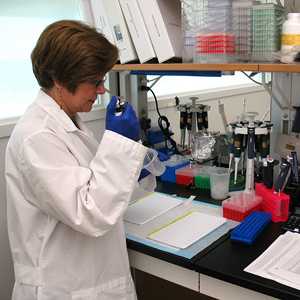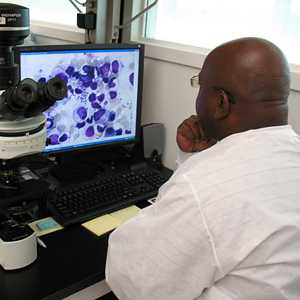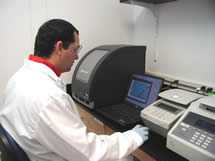Laboratory Science

A CDC microbiologist using immunological tests to diagnose parasitic infections. (CDC Photo)
The Parasitic Diseases Branch conducts laboratory research that contributes to the overall mission to prevent and control parasitic diseases, both domestically and internationally. Scientists in the Branch:
- identify and characterize new disease-causing parasites using DNA analyses and genomics;
- study the natural cycles of parasite transmission and infection in humans and animals;
- study the immune response to parasitic infections; and
- examine the responses in infected people to confirm successful cures in patients.
Scientists also are investigating the processes that parasites use to infect and cause disease in people and animals and the ways parasites become resistant to methods of treatment and prevention.
In addition to innovative research projects, the Branch provides reference diagnostic services to public health partners worldwide who have difficulty diagnosing parasitic infections. This unit serves as a final reference laboratory for state public health departments and laboratories in the private sector. Our reference diagnostic services include telediagnosis, morphology, serology, and molecular testing.

A CDC microbiologist reviewing a telediagnosis request. (CDC Photo)
More on: Available Tests [DPDx]
When a laboratory requests assistance in identifying a parasitic organism or for confirmation of a presumed diagnosis and have access to a digital camera, Branch staff can use telediagnosis to help. Telediagnosis involves the e-mail transmission of data, such as digital images of human tissue, to the CDC. Branch staff responses to these inquiries can be provided in a matter of minutes to hours. If you are a laboratory scientist or a pathologist and want to utilize our telediagnosis assistance*, please visit the Diagnostic Assistance section on the DPDx Web site.
*Telediagnosis assistance is available to health professionals such as laboratorians and pathologists. Through the use of telediagnosis, CDC can provide rapid diagnostic feedback for cases of parasitic infections. However, if you have an urgent case, please do not delay case management.

A CDC scientist reviews real-time PCR results. (CDC Photo)
Our diagnostic laboratories offer DNA-based testing on a variety of clinical specimens, including stool, blood, tissue, and exudates. Selected PCR-based tests are available in our reference diagnostic laboratory for the species identification of parasites for cases in which morphologic examinations are unclear and further DNA molecular analysis is necessary.
Laboratory researchers also offer short- and long-term training opportunities, including pre- and post-doctoral research training fellowships and short courses for public health laboratory microbiologists.
More on: DPDx: Laboratory Identification of Parasites of Public Health Concern
Related Laboratory Staff Links
- Page last reviewed: October 6, 2015
- Page last updated: October 6, 2015
- Content source:


 ShareCompartir
ShareCompartir